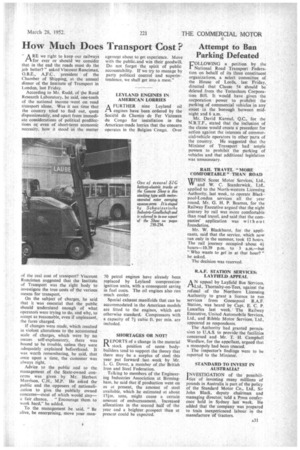How Much Does Transport Cost ?
Page 33

If you've noticed an error in this article please click here to report it so we can fix it.
" ARE we right to keep our railways for ever or should we consider that in the end the roads must do the job better?" asked Viscount Runciman, 0.B.E., A.F.0 , president of the Chamber of Shipping, at the annual dinner of the Institute of Transport in London, last Friday.
According to Mr. Rudd, of the Road Research Laboratory, he said, one-tenth of the national income -went on road transport alone. Was it not time that the country tried to find out, quite dispassionately, and apart from immediate considerations of political predilections or even of short-term economic necessity, how it stood in the matter of the real cost of transport? Viscount Runciman suggested that the Institute of Transport was the right body to investigate the true costs of the various means for transport.
On the subject of charges, he said that it was essential that the public should understand enough of what operators were trying to do, and why, to accept as reasonable, even if unpleasant, the fares charged.
If changes were made, which resulted in violent alterations to the accustomed scale of charges, which were by no means self-explanatory, there was hound to be trouble, unless they were adequately explained beforehand. It was worth remembering, he said, that once upon a time, the customer was always right.
Advice to the public and to the management of the State-owned coneesns was given by Mr. Herbert Morrison, C.H., M.P. He asked the public and the opposers of nationalization to give the publicly owned concerns—most of which would ,stay— a fair chance. "Encourage them to work hard," he added.
To the management he said, " Be alive, be enterprising, move your man
agement about to get experience. Move with the public-and win their goodwill. Do not forget the spirit of public accountability. If we try to manage by party political control and superintendence, we shall get into a mess."
LEYLAND ENGINES IN AMERICAN LORRIES •
A FURTHER nine Leyland oil engines have been ordered by the Societe de Chemin de Fer Vicinaux du Congo for installation in the American-made lorries that the concern operates in the Belgian Congo. Over
70 petrol engines have already been replaced by Leyland compressionignition units, with a consequent saving in fuel costs. The oil engines also run much cooler.
Special exhaust manifolds that can be accommodated in the American models are fitted to the engines, which are otherwise standard. Compressors with a capacity of 71 cubic ft. per min. are included.
SHORTAGES OR NOT? ,
D EPORTS of a change in the material
stock position of some bodybuilders tend to support the theory that there may be a surplus of steel this year put forward last_ week by Mr. L. G. Dover, a member of the British Iron and Steel Federation.
Talking to members of the Engineering Industries Association at Birmingham, he said that if production went on as at present, the amount of steel available, which he estimated at about 17m. tons, might cause a certainamount of embarrassment. Increased allocations in the second half of the year and a brighter prospect than at present could be expected.




















































































